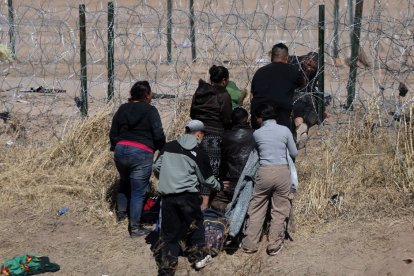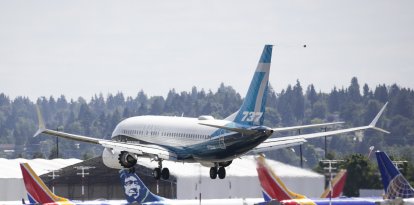Biden's border policy, a multimillion-dollar business for traffickers: 'Nobody crosses without paying the cartels'
Drug cartels added lucrative human trafficking and smuggling across the southern border to their business portfolio. They offer packages for various prices, although arrival is never guaranteed.

Migrantes cruzan la frontera | Herika Martinez / AFP
On the side of a road in Crane County, Texas, authorities found the body of a young Guatemalan woman. It was 2021, Biden's first year in office. The immigrant had left her native Guatemala, crossed Mexico and was nearly 60 miles across the U.S. border. All for about $10,000.
Six Guatemalan citizens were convicted of the crime. The latest to be arrested, Gael Galicia and Tercero-González, were captured near a trailer where they were hiding more illegal immigrants. According to court documents, each of the migrants paid between $10,000 and $12,000.
Andres, Siete, Canche and Bud Light, as the henchmen of Galicia and González, AKA Artemio and Luis, entered and left early in a business that was then growing, and today is bustling .
Business is so profitable that all the big cartels want a piece of the pie. So says Ian Hanna, co-director of a working group in charge of the previous case, specifically regarding Mexico.
The Joint Task Force Alpha (JTFA), which Hanna directs with Jim Hepburn, was founded three years ago to go after cartels that smuggle people from El Salvador, Guatemala, Honduras and Mexico to American streets and fields. His motto: "Go after the most egregious targets." Trafficking of minors, murders on the border, semi-trailers full of abandoned immigrants...
"I think we are seeing a shift where the – where the cartels have seen how profitable it can be to move humans, just as they have always moved drugs," explains Hepburn. Before, he says, a cartel could settle for charging a tax or rent an apartment to those who passed through their territory. Now this is not enough: "They have decided to not only charge a piso [apartment] but to actually be more hands-on with smuggling itself."
A million-dollar business
The most important cartels have a varied business portfolio. In addition to drug cartels, they are cartels of kidnappings, prostitution, hired killings, avocados (known as "green gold"), tortillas and more.
Speaking on human trafficking and smuggling, which has even been gaining ground on drugs, Jessica M. Vaughan, director of policy studies at the Center for Immigration Studies, said a year ago: "In the last two years, reportedly, the cartels have reaped more revenue from the human smuggling and trafficking business than they have from drug trafficking."
And in this mix of smuggling and trafficking, the former is the jackpot. While both involve illegal border crossings, smuggling is a transport service hired by the immigrant. Trafficking, on the other hand, aims to commit another crime at the destination, such as sexual slavery. "The vast amount of money" explains the JTFA, is in smuggling.
Monthly, the cartels obtain more than $1 billion from these illicit activities, according to CBP data shared by Congressman Lloyd Smucker. Mark E. Green, chairman of the Homeland Security Committee, assured that the cartels pocketed $13 billion from human trafficking and smuggling in 2021 alone and that, from then to now, "cartels have made a record amount of money."
The Economist magazine put the figure at $5 billion a year "from helping migrants across borders, often robbing them en route."
In January of this year, the House Judiciary Committee reported a Border Patrol estimate that in the Del Río, Texas, sector alone, the cartels earned $32 million a week from illegal migrant crossings.
"This is obviously difficult to track," warns Vaughan. However, based on previous estimates and "considering that illegal crossings were higher in 2023 than in 2022," the director of policy studies at the Center for Immigration Studies calculates for Voz Media that since Biden entered the White House, the cartels have generated between $65-68 billion from trafficking and smuggling.
Owners of the border
Last July, Vaughan argued before the Homeland Security Committee that Biden's immigration policies were "outrageously lucrative" for smugglers because the ease of entering the country generated "a near endless supply of paying customers willing to risk working with criminal organizations to seek passage to the border."
Even more, she added in her conversation with Voz Media:
"Nobody crosses without paying the cartels," said Joel Martínez, chief agent of the Border Patrol in the Laredo, Texas, sector, in a hearing. which he shared with seven other border agents before two House committees. When it started in 1995, he recalls, "people could just get to the border and cross on their own."
The same was stated by Gregory Bovino, head of the El Centro sector in California, that it is "uncommon" for an immigrant to cross without assistance from the cartels. John Modlin from Tucson, Ariz, agreed that "absolutely everyone" hires coyotes.
The cartels protect their business zealously, punishing anyone who ventures to cross without paying them. The leaders of the different sectors described cases of assaults, beatings and executions.
"The other day, we had two people wash up to our shores," Martinez said. None of them had identification. "One of them had his head halfway blown off, and the other one was shot between the eyes." They were, the agent believes, immigrants who tried to cross without permission.
Martinez explains that in Laredo there are bosses who lord over sections of the river and that if anyone goes without their permission, "they can either beat you or hit you with, like, a paddle, and they’ve been known to shoot people. ... They rule through intimidation, so that’s a very common practice."
Offers for all budgets
The average cost of crossing the border is $8,000 per person, according to CBP. It varies, however, depending on the distance from where the service is contracted: Mexico is not the same as Guatemala, nor is it when starting from another continent.
It also increases if the client wants to avoid the Border Patrol and decreases if their ultimate goal is to surrender. Crossing by water is more expensive. If, however, one chooses to join a group of 200 or 300 people, the cost may go down. The same if they acts as a mule (a person who transports drugs) or if they "lend" a child so that another immigrant can use them during their own crossing.
In case one still cannot afford the trip, the cartels offer another package: a debt bond. After paying a reduced initial fee, crossing the border, immigrants end up paying the cost of the trip on American soil, sometimes with their salary or rent payments.
The cartels also profit from appointments on CBP One, the application introduced by the Biden administration for immigrants to present their case to the Border Patrol. This was revealed by internal documents from the Department of Homeland Security (DHS) published in August, although spokespersons for the agency denied the accusations.
Experts, patrol agents, and bodies found in border areas confirm that no matter what price is paid, entry into the United States is not guaranteed.
As border agent Jason Owens of the Del Río sector describes, migrants are treated like "cattle." So much so that sometimes criminal organizations sell them to each other. Sometimes they abandon them in the desert if they walk too slowly, and other times they leave them to suffocate inside trailers.
Will this affect Biden's new policies?
Earlier this month, the president signed an executive order to ease the migration crisis. One of the measures, the best known, allows the president cancel asylum applications if daily encounters at entry points exceed 2,500, a mark easily surpassed.
Another offers rewards for information to capture human traffickers and revokes the visas of those who profit from this illegal business.
Although she expects a slight drop, Vaughan assures that this will only occur while the cartels evaluate how to take advantage of the new system.
"There is a nearly endless worldwide supply of people in who will still have a big incentive to come, even under the new policies," she said. This is especially true for families and adults from non-Central American countries and unaccompanied minors.
She assured the same as National Border Council Vice President Art Del Cueto, a frequent critic of the administration's border policy. He added on the program "Just the News, No Noise":
The directors of Joint Task Force Alpha do not agree. In fact, they believe that it will reduce the number of unaccompanied children. Despite refusing to comment on the effectiveness of the new policy, they agree that the cartels will not give up ground without a fight. They have established an infrastructure and will seek to defend it. "They’re here right now," they insist. "And they continue to be here in the weeks and months later."
RECOMMENDATION





















